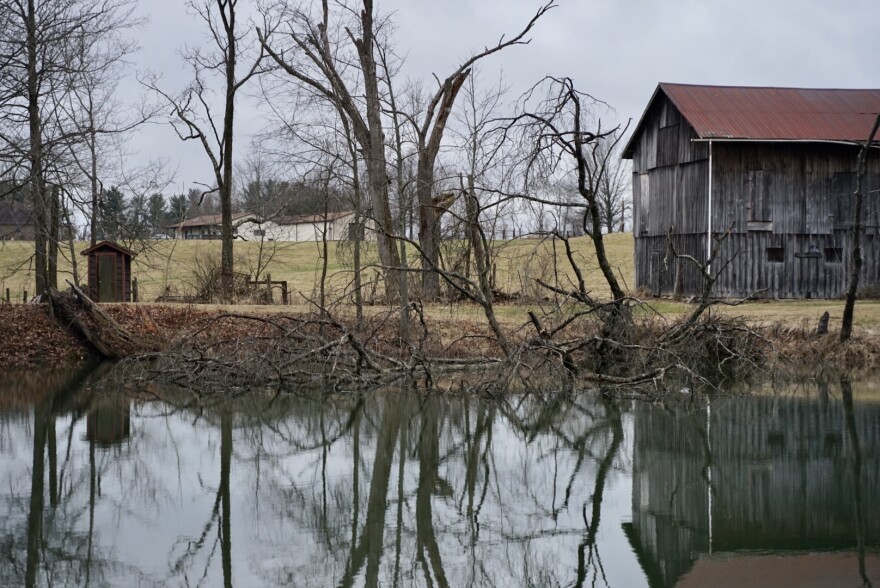Katie Schwarzwaelder, 30, ran a dog kennel on her property in Darlington, Pennsylvania, where she also bred Dobermans. But her house is a little over a mile away from where a Norfolk Southern train derailed in East Palestine on Feb. 3, and parts of her 27-acre property are less than half a mile away. So she was told to evacuate ahead of a controlled burn of the toxic chemicals contained in the derailed cars.
Her family ended up taking 30 dogs with them to a family member’s basement 15 miles away, and they have been living there ever since. Schwarzwaelder said Norfolk Southern contractors came to test the air quality in her home, but she said she doesn’t trust the company and doesn’t trust the results of air and water quality tests saying it is safe to return.
"We are still evacuated, and we are not going back,” she told Pennsylvania lawmakers at a hearing of the Senate Veterans and Emergency Services Committee on Feb. 23. “If I have to live in a basement, if we have to put our livelihood at risk or [set] our livelihood aside to live this way, we're going to do that.”
Schwarzwaelder isn’t alone. Decisions by families like hers to leave or stay away from East Palestine and neighboring areas are upending the local real estate market. And changes in the real estate market threaten the property values of residents at a time when they are already experiencing multiple health and environmental uncertainties.
A handful of people who were planning to buy homes in the East Palestine area have backed out, and others who were looking for homes in the area have stopped. At least one bank has said it won’t offer any mortgages in the area and realtors say some investors have begun making low-ball offers on homes that have gone up for sale in the hopes of buying homes at a discount.

The unprecedented situation is throwing typical real estate practices out the window. Realtors say home owners who back out of a sale typically forfeit a deposit if they back out without finding anything wrong with the house. But Holly Ritchie, a local realtor, said she isn’t sure what to do now because their contracts don’t have language that covers environmental contamination from train derailments.
Ritchie leads a team of 20 realtors and said her group has already lost several sales from customers who have backed out. One of the women who was selling her house has already moved into a rental, Ritchie said. Now the woman is responsible for paying both her rent and the mortgage, and she can’t afford to pay both.
Ritchie said the derailment is not just impacting agents selling homes near the derailment site in East Palestine, but those selling properties in nearby towns as well.
“They're afraid of showering with the water. They're afraid to cook with the water,” she said. “I don't think [Norfolk Southern is] being honest. I don't think they're being honest with anybody.”
Backing out, moving away
Ashley Martin, a realtor in Ritchie’s group, said she lost a sale in Wellsville, Ohio, more than 20 miles from East Palestine, because of the derailment. The buyers were from Las Vegas and had offered cash but sent a last-minute email that said worries about chemicals and bad press caused them to start looking for a home elsewhere. Martin said she’s heard from two other buyers who were looking in the area but have now put their plans on hold.
The news isn’t all bad. One woman who lives 30 minutes away from East Palestine is going forward with her plans to purchase a home in East Palestine, Martin said. “She thinks that there was no way that any of those chemicals could have affected the area that she's in,” Martin said.
On the other hand, Martin is about to list a home from a family who doesn’t think it’s safe to live in town anymore. She said the family was away at a funeral during the derailment and is only returning this week to gather up all their things. The father seemed so convinced of the potential dangers that Martin herself has begun giving her pets bottled water, even though she lives 20 miles away from the derailment site.
Katherine Oesch, a realtor out of Canfield, Ohio, said three families who she hadn’t heard from in years reached out to her in the last week about potentially selling their homes. And each of those families has a child less than a year old, she said, and are worried about their health. One person she spoke to who wants to leave could be forced to stay in his home if the market falls, Oesch said, because he wouldn’t be able to afford the debt on the mortgage if his house sells for less than he paid for it.
Scott Fosnot, a realtor who works out of Monaca, said he’s heard from a couple of families looking for rentals in Pennsylvania who are planning to put their homes up for sale in East Palestine.
Amber Hostetter, a real estate agent who lives just over the border from East Palestine in Pennsylvania, said there have been a number of tenants in East Palestine who have moved out since the derailment, which is putting landlords in a bind. Hostetter’s 6-year-old attends kindergarten in East Palestine, and she said there’s been at least a handful of kids who haven’t returned since the derailment.

Most long-time residents like Hostetter are waiting to see what happens, she said: Many residents are elderly or live paycheck-to-paycheck and can’t afford to just up and leave. She’s talked to home owners who wanted to downsize but are now waiting to see what happens to the market before listing their properties. Hostetter was planning on building her dream home on her family’s property this year but those plans are also on hold.
Marcy Ford lives in Darlington, Pennsylvania and was planning on selling her home and moving to the family farm in East Palestine, which she inherited after her father passed away. “Who's going to buy my house in Darlington? I'm three miles from ground zero,” she told Ohio Senator J.D. Vance during a visit last week.
Waiting to see
Although the fears are pervasive, the bottom hasn’t fallen out of the market yet, Hostetter and other real estate agents say. A handful of Hostetter’s buyers have agreed to go forward with their purchases, even after the derailment. Local real estate prices are typically appraised using prices from at least the last 90 days, so buyers should still be able to get mortgages. But real estate appraisers have said that they will start adding an addendum to their appraisals that informs banks about the derailment, and it’s unclear how banks might respond.
Tami Harris, a realtor who lives by the high school in East Palestine, said a buyer from out of town closed on a home purchase last week. Harris said she paid $200 for soil testing in Youngstown from dirt taken from a couple of her rental properties in East Palestine. The results came back safe, she said, although she wasn’t sure exactly what the lab had tested for.
Harris worries that the changes in the real estate market are being driven by ignorance and is going to hurt residents whose savings are bound up in their homes. “It's kind of disheartening because, unfortunately, we still don't have any what I consider to be real facts or answers yet about the environment here,” she said. “They're telling us the water is safe, the air is safe.”

Although some sales that were negotiated before the derailment have been finalized since, realtors say the real test will be what happens to homes that are being listed for the first time after the derailment. An East Palestine couple getting divorced went ahead and put their home up for sale this week, Oesch said, and they’ve received only one, low, all-cash offer that they rejected.
“It was insulting,” Oesh said. “They are already in this terrible situation and then now they feel like they're getting kicked in the face with the value of their home.”
The reason for the lower offer, Oesch said, was a bank in Pennsylvania had stopped lending for homes in the area, and the buyer thought prices would fall as a result. Oesch said she confirmed this with a loan officer at the bank but said she has talked to several other banks who are continuing to make loans in the area.
Oesch worries that nervous home sellers could turn the fear of decreased housing values into a reality. “If they sell out of fear, then 3 to 6 months down the road we will have reduced values because sellers essentially just dump their houses to get out,” she said. “But we won't know that for another 3 to 6 months.”
Some homebuyers are hoping that they will be able to sue Norfolk Southern if they are forced to sell their homes at a loss. And some realtors said they would consider joining lawsuits as well if they lose business because of the derailment.
Democratic Pennsylvania Sen. Katie Muth told East Palestine residents during a hearing Feb. 23 that she thought they should have the option of being bought out. “You deserve to be bought out and moved is what you really deserve,” she said. “I want each and everyone to be somewhere safe with your family.”





